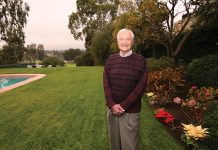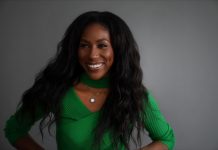Today, his name is attached to six Emmys. But when graduated from Seaholm High School in 1993, he had no aspirations to go into television.
At Albion College, he studied English, joined the soccer team, and performed around town with his band, Jabba the Funk. Post-graduation, he moved to Ann Arbor and tried to start a new band, bartending to support himself.
Then, his girlfriend, Maggie, got an internship at the Today show, and he went to visit her in New York City. “It was the first time I realized that jobs like that exist, that it really felt tangible,” Kadro says. Shortly after, he moved to Los Angeles and entered the , a paid yearlong fellowship that serves as an entry point for many aspiring television professionals (like Kenneth Parcell, the 30 Rock character, for instance).
He moved up the ranks within the company and would remain there for 10 years, during which he spent much of his time producing Last Call with Carson Daly. In 2010, he shifted to CBS, where he was a producer for CBS This Morning for seven years. He also spent some time as the head of news for daily programming at Quibi, the short-lived short-form streaming platform that dissolved in 2020. Today, he serves as CNN’s senior vice president of content strategy (and Maggie is his wife).
What does a typical workday look like for you?
I’m involved in developing a lot of shows for the network. You must be fundamentally aware of what’s happening in the world, but you’re also trying to see where the audience is going. Some things work; some things don’t. And hopefully you’re learning enough in the process to make your next bet that much of a smarter bet.
What was it like growing up in Birmingham?
I have three younger brothers. My dad is from the Middle East and came over from Syria. He and my mom, they met in Pittsburgh in ’71, and they moved to the Detroit area in ’73. I bring that up because the conversations that we would have around our kitchen table were really sort of different than a lot of other things that I was exposed to at the time.
Are there any conversations that come to mind?
We were watching the conflict between Israel and Palestinians. I remember my dad really helping me understand what I was seeing: why people were throwing rocks, why this conflict was happening, from the causes, what everybody wanted out of it, everybody’s claims. That was typical.
I also remember coming home one night around the time that the “don’t ask, don’t tell” conversation was happening in this country, during the Clinton administration, and having conversations about that. I remember, in my senior year of high school, they tried to change the curriculum in our health class to not teach us about LGBT lifestyle, even though we were all going off to college and were going to be exposed to it.
How did you get your first big break?
A guy named Steve Agase who worked in ad sales at NBC told me about the page program. He got me an interview there — he was helpful to me early on. As a page, I got an assignment in primetime series. And there was a [fellow Seaholm grad], Jeff Ingold, who was an executive at NBC at the time — we connected over our Michigan roots.
Jeff helped me get my foot into different doors within NBC and helped me land my first job as an assistant in the development office at NBC Studios. We were developing a late-night show with Carson Daly at the time. I was still obsessed with music, and I knew that that show was going to be music-heavy, and I was into the idea of going to work on that show. And they gave me a job as a researcher.
How did the idea for CNN’s King Charles, the news talk show with Gayle King and Charles Barkley, come about? (Note: Shortly after the interview took place, CNN announced the show would end April 15.)
It would have been in the fall of 2022. Charles had signed a new deal with . We were looking for different programming ideas for him beyond just Inside the NBA. I had worked with Gayle previously; she’s a unique talent. There’s nobody like her. And there’s nobody like Charles. The chemistry is never an exact science; you just get hunches.
We approached them each separately about the idea, and they were both intrigued. And then we got them on a call together and within five minutes knew we had a fascinating pair. I think anybody who watches the show will see that they have something really special.
What can you tell me about the 2018 CBS This Morning segment at Michigan Central Station?
[Ford Motor Co.’s broadcast communications manager] Dan Barbossa worked at CBS News before — he had an affinity for CBS. He brought Bill Ford Jr. to CBS News. And they were telling us about the project. We were like, “We want to tell this story.” So, we ended up doing it for the morning show. And I took Gayle to interview him at the train station before they’d done any of the construction. And then we went to afterwards, which was fantastic.
How did she like Slows?
She loved Slows. We had a great experience with Bill. And then, when Detroit-style pizza was really starting to make its way into the national consciousness, we did a story on that at CBS. We had Buddy’s Pizza flown out to give to the staff. I’m always trying to represent the state.
What moments do you remember most vividly over the course of your career?
CBS was really a playground. Like, we did the first broadcast from the One World Trade Center when that opened. We also did the first broadcast from the [in Washington, D.C.]. Trying to tell the story of that museum for the first time was incredibly powerful for all of us.
We also did a show from the White House looking back at the first 100 days of the Trump administration. That’s another one of those moments where you’re like, “How did I get here? How am I standing in the Blue Room by myself at 5 o’clock in the morning, about to broadcast live?” And then the responsibility that you feel when you’re producing an inauguration or breaking news coverage, and you have people depending on you for an accurate representation of what’s happening, why it happened, and what it means.
Those are really powerful moments.
This story originally appeared in the June 2024 issue of Â鶹·¬şĹ Detroit magazine. To read more, pick up a copy of Â鶹·¬şĹ Detroit at a local retail outlet. Our digital edition will be available on June 6.
|
| Ěý |
|








